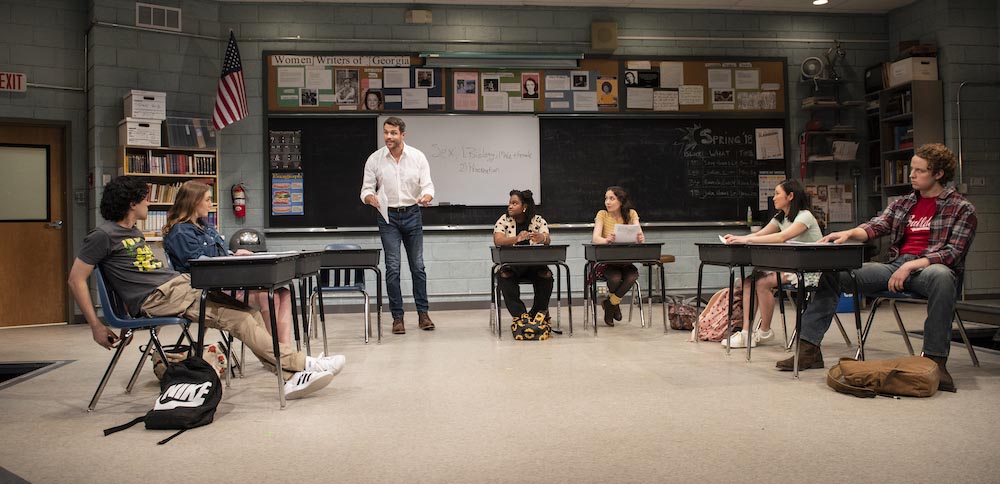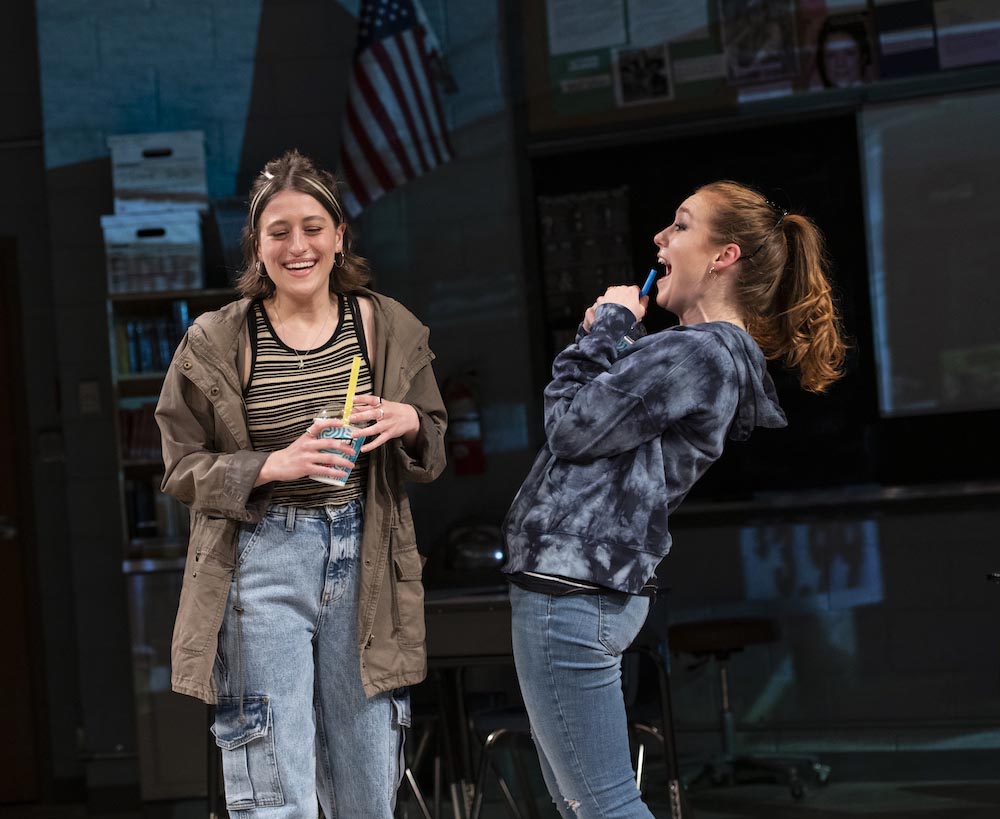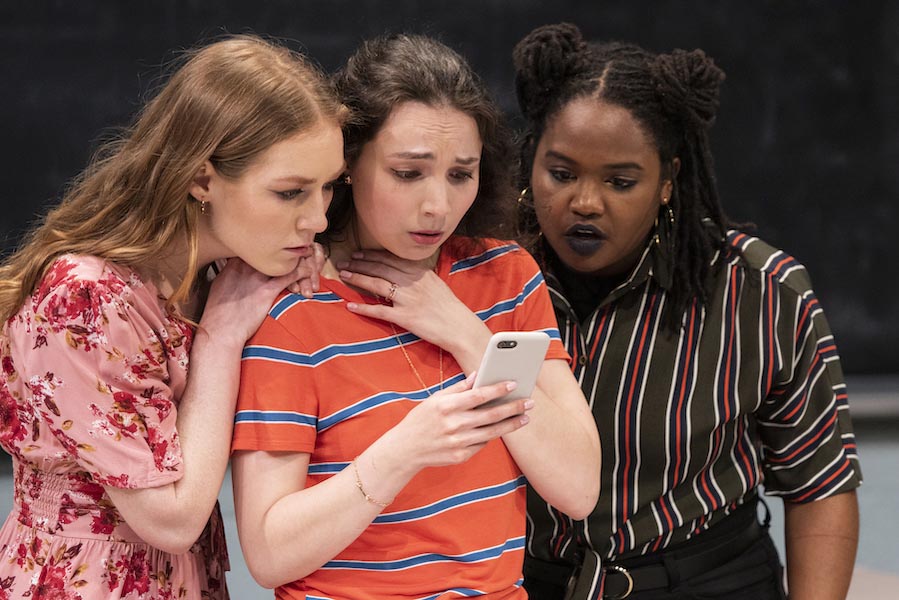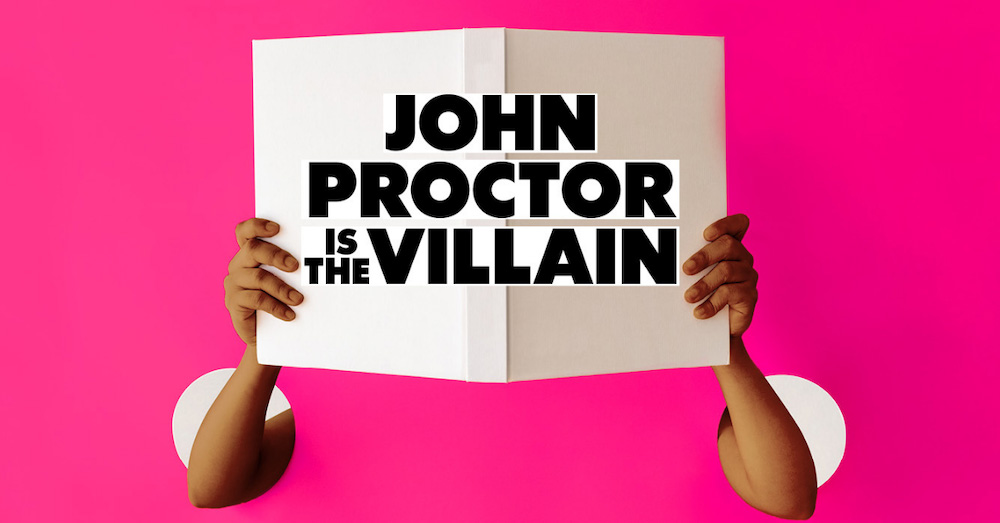The unchecked power of a theocratic state comes down on innocent people in a community, executing 20 of them, for a crime that they not only did not commit but that never happened. So it was in the 1692 witchcraft panic in Salem, Massachusetts, an event fictionalized by Arthur Miller in his 1953 play The Crucible. In Kimberly Belflower’s new play, John Proctor Is the Villain, now having a world premiere run at Studio Theatre, students in a rural Georgia high school set about deconstructing Miller’s play in light of #MeToo era feminism. There’s a lot to unpack here.
Five of the students are women — Ivy Watkins (Resa Mishina), Nell Shaw (Deidre Staples), Raelynn Nix (Jordan Slattery), Shelby Holcomb (Juliana Sass), and Beth Powell (Miranda Rizzol1o). Each is a distinct individual, sometimes “dramatic” from adults’ point of view — which means, Nell comments, that they’re girls. They never fail to be believable teenagers.
The girls can, almost simultaneously, be engaged with the personal lives of their favorite pop stars (which of Taylor Swift’s ex-boyfriends would she be most likely to murder?), aching personal concerns (a cheating boyfriend, a father accused of sexual impropriety with an employee), and the issues that women face in the world (they form a feminism club). There are only two boys in the class: Lee (Zachary Keller), embodying teenage toxic masculinity, and Mason Adams (Ignacio Diaz-Silverio), who we first see as a slacker; later he becomes something more.

They are studying The Crucible in an honors literature class, led by Carter Smith (Dave Register), very much the cool teacher, who takes interest in the intellectual and personal lives of his students, and in whom they feel they can confide. The usually realistic Nell thinks of him as the sort of teacher found in inspirational movies. Beth, the smart, eager student who’s always raising her hand, thinks he’s the best teacher she’s ever had. When she and Mr. Smith talk of parallels between Lorde’s song “Green Light” and The Great Gatsby, there is real excitement in their connection.
Mr. Smith teaches The Crucible in a traditional way, seeing John Proctor as a principled fighter for goodness who maintains his honor at the cost of his life. The girls aren’t buying. Shelby, “intense,” clearly troubled, returning to school after a long, unexplained absence, argues that, to the contrary, John Proctor is the villain. After all, as a 35-year-old man, he has sex with an already traumatized teenage girl, who was his employee, and then throws her out. How can someone like that be respected? Where is his “goodness”?
Belflower’s script deals frankly with young girls’ sexual vulnerability to older men, a reason why the John/Abigail relationship resonates strongly with the students, intersecting as it does with events in their own lives. It’s hard to fault the students for focusing more on the personal dynamic between John and Abigail than on the broader effects of Abigail’s choices on Salem. Abigail dances defiantly, she seizes agency. That has an undeniable appeal to these young women confronting the effects of male power.
Unlike Abigail, Belflower’s students, especially Shelby, confront that power by telling the truth. They do so in the context of relationships with one another that strengthen them. Shelby and Raelynn repair their strained best-friend connection, as do Beth and Ivy. At the end of the play, Raelynn delivers a stirring monologue that expresses her vision that one day, no longer constrained by “the men in charge,” she and Shelby and the other girls will be able to “use our fire only for warmth.” They dance. It’s an exhilarating moment.
Studio’s production, directed by Marti Lyons, is notable for fine ensemble playing. It embeds its feminist message in the very real, sometimes mercurial, emotions of teenagers, being both entertaining — there’s a lot of humor in the play, especially early on — and gripping. The physical production is relatively simple: a classroom, with mostly area lighting, and blackouts spiced with pop music between the mostly short scenes. That scene structure helps to maintain the quick pace that Belflower sought. While the script describes the play as being done without intermission, Studio inserted one, breaking at a particularly dramatic point. The choice works.

The term “thought-provoking” can sometimes be applied to a play loosely. This one deserves the term, particularly as it opens a conversation with the underlying classic Miller play about the issues that matter to people, perhaps especially young people, today. Belflower’s script provides key information about The Crucible to the audience, but here are some of the additional thoughts that occurred to me as I watched John Proctor Is the Villain with the older play in mind.
First, a dark view of John in the context of his relationship with Abigail has always been implicit in The Crucible. In the “forest scene” that opens the second act (unfortunately cut in many productions, but to which Belflower’s script indirectly refers), we see Abigail’s passionate vulnerability and John’s capacity for hatred and violence. I have never found it possible to watch that scene played well without feeling empathy for Abigail’s motivations and finding John’s pride and arrogance repellant. Belflower performs a service by making this thread explicit.

Second, it’s fair to ask whether the positive view of Abigail in John Proctor Is the Villain is persuasive. In the dramaturg’s note for the production, Belflower says she loves Abigail. Shelby finds her “awesome.” But consider the consequences of her actions: Abby lied, people died. Fourteen of the 20 people killed by the authorities were women. This is not a result to love, from a feminist or any other perspective. However much grounded in John’s wrongful conduct toward her, Abigail’s actions enable a punitive exercise of power by the state, a structure that oppressed women. It’s something that Belflower’s characters don’t confront.
Third, toward the end of the first act, Shelby attacks the belief that John’s insistence on protecting the honor of his name is laudable. While she doesn’t raise the point explicitly, here Shelby is tapping into something important. The concept of honor itself, tied as it is to hierarchy and violence, can be an important part of the fabric of male control of women (at an extreme, the “honor killings” of young women in some cultures). The combination of Miller’s and Belflower’s plays is a good place to begin a critique of the notion that honor is necessarily a good thing.
I can say, without qualification, that this is one of the most thought-provoking and conversation-provoking shows I have seen in recent memory. It’s also cracking good theater, to which the audience responded enthusiastically. Add it to your “must see” list.
Running Time: Two hours 20 minutes including one intermission.
EXTENDED: John Proctor Is the Villain plays through June 12, 2022, at Studio Theatre’s Mead Theatre, 1501 14th Street NW, Washington, DC. Tickets ($45–$95, with low-cost options and discounts available) can be purchased online or by calling (202) 332-3300.
The program for John Proctor Is the Villain is online here.
COVID Safety: Proof of vaccination (or a negative COVID test) and facemask are required. Studio Theatre’s complete Health and Safety protocols are here.
SEE ALSO:
Gen Z feminism is the hero in ‘John Proctor Is the Villain’ (Magic Time! column by John Stoltenberg)






“However much grounded in John’s wrongful conduct toward her, Abigail’s actions enable a punitive exercise of power by the state, a structure that oppressed women. It’s something that Belflower’s characters don’t confront.”
This statement in the review is incorrect. Shelby is punished by the school, Mr. Smith is not.